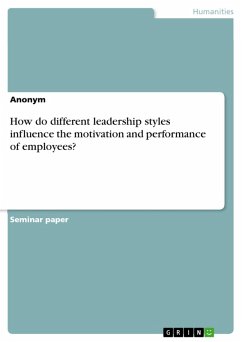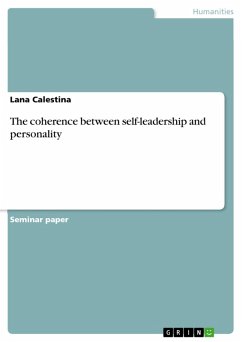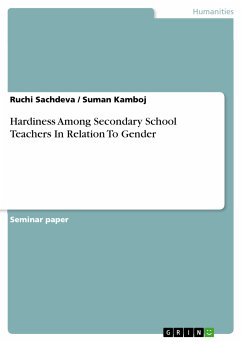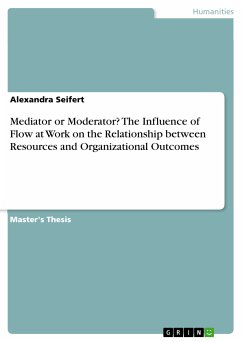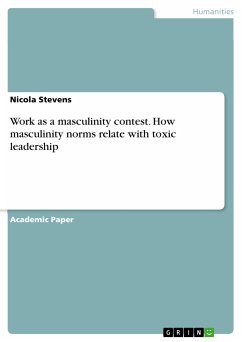
Work as a masculinity contest. How masculinity norms relate with toxic leadership (eBook, PDF)
Sofort per Download lieferbar
Statt: 16,95 €**
13,99 €
inkl. MwSt. und vom Verlag festgesetzt.
**Preis der gedruckten Ausgabe (Broschiertes Buch)
Alle Infos zum eBook verschenkenWeitere Ausgaben:

PAYBACK Punkte
0 °P sammeln!
Academic Paper from the year 2020 in the subject Psychology - Work, Business, Organisation, grade: 1,0, MSB Medical School Berlin - Hochschule für Gesundheit und Medizin, language: English, abstract: Toxic leadership is a serious issue that can certainly have many different facets and causes. For today management is still an area that is fairly dominated by male employees. This paper aims to take a closer look at the socio-cultural causes of toxic leadership that could lie in the role of the traditional man. I ask myself the question: How does our cultural understanding of how male leadership...
Academic Paper from the year 2020 in the subject Psychology - Work, Business, Organisation, grade: 1,0, MSB Medical School Berlin - Hochschule für Gesundheit und Medizin, language: English, abstract: Toxic leadership is a serious issue that can certainly have many different facets and causes. For today management is still an area that is fairly dominated by male employees. This paper aims to take a closer look at the socio-cultural causes of toxic leadership that could lie in the role of the traditional man. I ask myself the question: How does our cultural understanding of how male leadership should look influence how leaders deal with subordinates could find expression in toxic leadership? This paper introduces the reader to a recently proposed organizational culture called masculinity contest culture (MCC), where negatively expressed masculinity norms serve as a fertile breeding ground for toxic leadership. Furthermore, I introduce another study that connects toxic leadership with the Social dominance orientation (SDO) and status enhancement motive, which could be closely related to the MCC. The last study deals with gender differences aligning with characteristics of follower groups from Padilla et.al. (2007) toxic triangle and gender differences in the perception of toxic leadership. They found that women view toxic leadership more negatively, as well as detect significantly more subtle forms of toxic leadership than men.
Dieser Download kann aus rechtlichen Gründen nur mit Rechnungsadresse in A, B, BG, CY, CZ, D, DK, EW, E, FIN, F, GR, HR, H, IRL, I, LT, L, LR, M, NL, PL, P, R, S, SLO, SK ausgeliefert werden.






